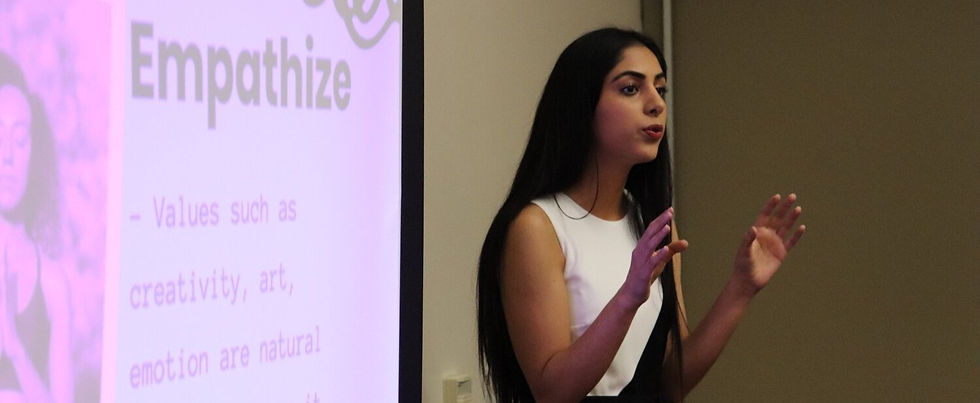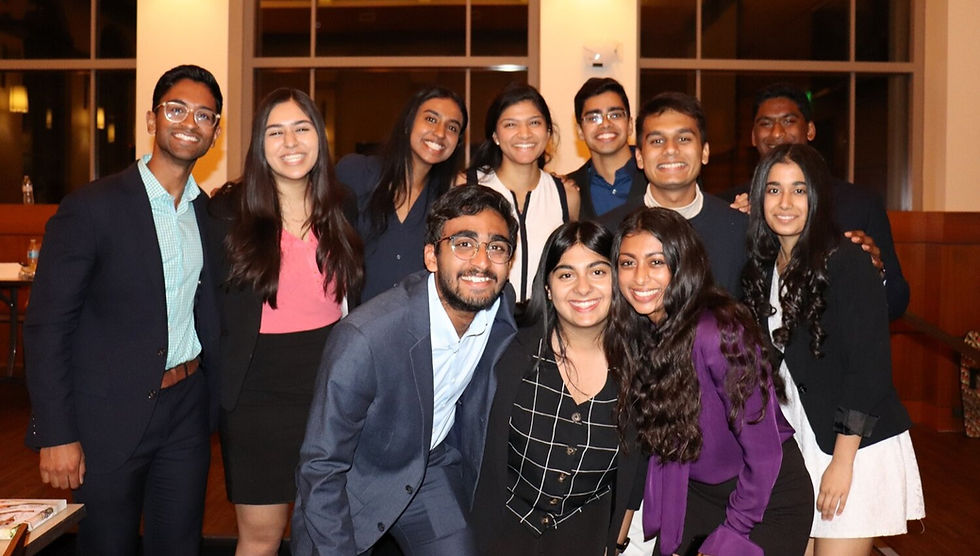RISE Recap 2020
- Gitika Pahwa

- Mar 20, 2020
- 7 min read
Our Development Branch’s flagship event was hosted last Friday, April 28th at The USC Ronald Tutor Campus Center. This year’s theme, Exploring Cultural Competency, allowed leaders across diverse fields to share advice for those hoping to create social impact in underserved communities.
Interview with Manushri Desai, VP of Development

Manushri (right) spearheaded RISE planning with Vineet Chauhan (left)
WHERE DID THE DESIRE TO HOST A CONFERENCE ON CULTURAL COMPETENCY COME FROM? DID ANY MOMENTS IN RISHI LAST YEAR/SEMESTER INSPIRE THE THEME OF THE CONFERENCE?
We wanted to help bolster the professional development of the organization internally and bring awareness to certain conversations that would be cornerstones of how we serve communities both in LA and India. This is why we thought it would be important for RISHI and USC to have a space to learn about how to most effectively conduct service whether that be through youth empowerment (RISE 2019) or cultural competency (RISE 2020). This year’s theme was inspired by an experience that Vineet had while he was volunteering at Share a Meal. One of the other volunteers didn’t know how to interact with the people she was serving in regards to how to connect with the population of persons experiencing homelessness and various other mental and physical illnesses on Skid Row. So he thought it would be extremely and important to have this conversation on cultural competency.

WHAT WAS THE GREATEST CHALLENGE WITH PLANNING THIS CONFERENCE? WHAT DO YOU CONSIDER THE GREATEST SUCCESS/ACHIEVEMENT TO COME OUT OF IT?
The greatest challenge in planning this conference was definitely making sure that every minutia was planned out and that the Development team was working together like a well-oiled engine because we really wanted to deliver a high quality conference where people that walked away from the event could point to something tangible they learned from the issue area of cultural competency and how it implement it into their daily lives and service practices. I consider the greatest success of the conference to be the engagement of the students that came out to the conference with the speakers because so many students reached out about connecting with the speakers after the conference because they wanted to continue those conversations outside of RISE. That is an extremely valuable and beautiful outcome of the conference that we can point to as far as its success because we wanted to get more people engaged in the conversation of cultural competency to begin with!

HOW DO YOU PLAN TO SUSTAIN THE CONVERSATIONS AND LEARNINGS THAT CAME OUT OF THE CONFERENCE?
As I said, a lot of students that came out to the conference asked for speakers’ contact information to continue those conversations of cultural competency outside RISE. But more tangibly there are two ways that we want to continue these conversations. (1) We are looking (currently) to partner with South Asian Productions through Dev to work to create a RISHI-centric event that would help increase awareness of South Asians in mass media and how to be culturally competent within the ‘desi’ umbrella. (2) We are hoping to invite all of our RISE speakers back to RISHI showcase for the networking aspect of our event where we will be discussing all the work that every branch has done with the speakers from RISE, non-profit partners in LA, and Ekal contacts in LA (just to name a few!). I think RISHI Showcase would be an excellent platform for members of Project RISHI and students from USC and UCLA to continue these conversations that were central to RISE.
Alex Fadil

Alex Fadil of UNICEF NextGen was the keynote speaker for RISE
As a Development Officer at Northwestern Mutual, Fadil strives to make his branch look and feel like the Greater Los Angeles Area-made up of people from all backgrounds and perspectives. At RISE, he spoke about how this goal for diversity is influenced heavily by his experience with UNICEF NextGen. He became involved with the organization as a student at USC and remains on the Steering Committee today.
Being both the son of Lebanese immigrants and a student at USC-one of the most diverse college campuses in the nation-taught him cultural acceptance from a young age. He saw the same cultural competence in students and other UNICEF workers who were able to witness the environments they were serving firsthand. UNICEF’s special agreements with various governments allows the organization to go into areas where there is a greater risk, but also greater need, to provide relief. While it may be easier to remove oneself from the philanthropy and aid they are providing, Fadil showed the audience how it can encourage growth on both a personal and professional level.
Stephanie Lomeli

Stephanie Lomeli, Attorney at Esperanza Immigrant Rights Project
The next speaker was Stephanie Lomeli, an attorney with the Esperanza Immigrant Rights Project. Stephanie and her organization work pro bono to assist immigrants in the Los Angeles going through removal proceedings, most of whom do not have the resources or know-how to represent themselves. Since the number of removal cases flowing through the immigration system is so high right now, Esperanza is not able to directly work on each case. Therefore, Stephanie explained, one of Esperanza’s initiatives is to empower immigrants who they cannot directly represent to fight for themselves by providing them with legal information and mentorship. This initiative is known as Community Education, and Stephanie leads it.
Although Stephanie is of Latina heritage, and many immigrants who she works with come from Latin American nations, Stephanie must still bridge a vast cultural divide in her work on a daily basis, and cultural competency is thus essential. To remind herself of the need for cultural competency, Stephanie often lists out all the challenges her clients have faced that she could not imagine facing herself (traveling for months through dangerous territory, facing domestic abuse, rape, and other violence, etc.). In her daily work, Stephanie strives to give her clients space to share their aspirations and incredible resilience, and her approach can truly be an example for all of us.
Sonia Doshi

Sonia Doshi, Manager at The Walt Disney Company
Sonia Doshi has worked in many fields-including mental health, technology, design, and learning science-but says cultural competency has consistently made her more effective in her roles. She first discovered the need for cultural competency as an engineering student at University of Michigan. Her team developed bio-sand water filters for a Jamaican community twice-without ever asking them if they wanted one. Taking a step back, they dedicated their next trip purely to need-finding. They learned the language, ate with locals, took part in civic activities, and realized that none of the challenges were related to water filtration. This experience allowed them to come back next time with solutions to problems the residents were actually facing.
Doshi breaks the process of being culturally competent into 3 steps: know your story, strive for empathy, and understand the context. RISE attendees were able to practice this with a gift-giving exercise. Groups of two and three asked in-depth questions about each other’s habits, needs, and desires in order to suggest the best gift for their partners. The experience was invaluable for many attendees:
“Doshi taught me that one of the key things to being culturally competent is having great empathy for people and just listening is so much more valuable than actively trying to make a change with no knowledge of the other person’s problems” -Rohan Palla
Trisha Batra

Trisha Batra, Founder of South Asian Productions
Trisha Batra is the founder of South Asian Productions. The organization started as a chat at a party in her senior year of college; Trisha was talking to her talented and artistic South Asian friends and was shocked to learn that most of them were taking traditional office jobs instead of pursuing their passions in the arts. Many of them talked about their fears of making it in the arts, and their fears of losing acceptance from their South Asian communities and families.
Hearing this, Trisha went home and decided that she wanted to do something about this, by creating a community of South Asian artists. Thus, South Asian Productions was born. The irony was not lost on Trisha that South Asian culture is one that celebrates Bollywood film, fashion, and art with such vigor, but does not respect the arts as a career path. She created an Instagram page to feature South Asians in the arts, and this page now has thousands of followers. She also created an initiative called “Coffee with Creatives” in major U.S. cities, which brings together South Asians in the arts so they can discuss shared experience and challenges, and form a support network of sorts.
Overall, Trisha has made it her mission to not let family pressures and community pressures prevent South Asians from entering the arts. From her work with South Asian Productions, she is well on the way to accomplishing this. We wish Trisha the best of luck!
Ankush Raj Gaur

Ankush Gaur, Founder of Wordable
Ankush Gaur is a doctor and entrepreneur. He comes from a family of immigrants and thus has been dealing with issues of cultural competency his whole life. He worked for a while as a physician and as an elementary school, but over time, he came to realize that his true passion was empowering those in need. This led him to start his company, Wordable.
Ankush’s idea for Wordable came from the fact that children from low-income households have heard, on average, 30 million less words by the age of 5 than children from higher income households. This puts these low-income students at a severe disadvantage academically from a young age. Seeing this issue, Ankush and his team created a wearable device that tells children stories as they walk.
Children must walk to hear the stories through the device, since research shows the benefits of tuning motor skills and engaging in language acquisition tasks simultaneously. The company is currently working to get the devices into schools in low-income neighborhoods, and ultimately into the hands of the children who need it most.
Thank you to everyone who attended!

The USC Project RISHI Spring 2020 Development Team

The 2020 RISE Conference was held in The Forum at the Ronald Tutor Campus Center



Comments